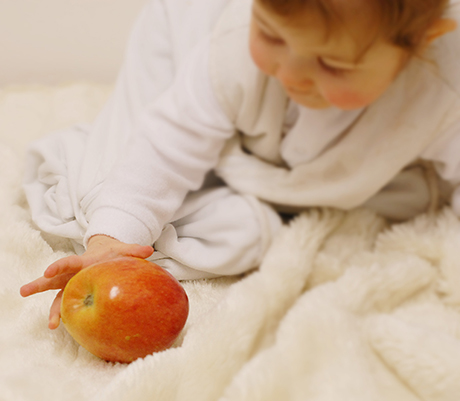
There is no definitive view on what children should eat in a Montessori school. However, there are basic principles of Montessori that should be taken into consideration when developing a healthy environment.
Montessorians Should Keep Nutrition in Mind During Prepared Environment Design
We are what we eat
Montessorians champion the child’s right to develop to his or her fullest potential. Helping this development can certainly be considered when thinking in terms of food and its nutritional value. Studies continue to prove that food additives, such as synthetic food coloring and preservatives have “substantial effects” on child behavior. (Utton) (Rowe & Rowe, 1994) Scientists in the UK have concluded that by removing artificial colorings and preservatives, hyperactivity in children could be significantly reduced. In fact, they believe that doing so would benefit all children, not just those with behavioral issues. (Utton) In light of this, children in the Montessori environment should be encouraged to forego processed foods in favor of foods that are as close as possible to their natural state — full of the vitamins and minerals that promote healthy development.
Sustainability
The education of even a very small child, therefore, does not aim at preparing him for school, but for life.
—Maria Montessori, Discovery of the Child (1948)
The idea of sustainability comes from the French root sustenir, meaning to “keep in existence, to provide sustenance and nourishment, and to strengthen the spirit and courage.” (Sutton, 2009) Ann Sutton, in Montessori Life, states that “Sustainability requires systems thinking,” emphasizing interconnectedness and interdependence. (Sutton, 2009) This corresponds beautifully with Montessori’s vision of Cosmic Education and the interconnectedness of all living things. If we teach about keeping the planet healthy and model environmental stewardship, it stands to reason that we need to model and encourage healthy living in our community.

Children are human beings to whom respect is due, superior to us by reason of their innocence and of the greater possibilities of their future.
—Maria Montessori, Dr. Montessori’s Own Handbook (1948)
Montessorians understand the importance of following the child and creating an environment to fit the needs of each child. A prepared environment means that we take into account everything the child encounters, including the foods they eat. We must ensure that we are providing high quality, nutritious food to encourage optimal brain function and overall growth and development. Learning to respect others necessitates developing self-respect as well. When we teach children to respect themselves, we must include healthy food.
A respectful healthy food policy carefully delineates the expectations of the school and should reflect the attitudes of the community at large. Parents or teachers who are apprehensive about school policy should respectfully discuss their concerns with the administration to see about how to bring about change.
As much as possible, NAMC’s web blog reflects the Montessori curriculum as provided in its teacher training programs. We realize and respect that Montessori schools are unique and may vary their schedules and offerings in accordance with the needs of their individual communities. We hope that our readers will find our articles useful and inspiring as a contribution to the global Montessori community.
© North American Montessori Center - originally posted in its entirety at Montessori Teacher Training on Friday, June 7, 2013.
© North American Montessori Center - originally posted in its entirety at Montessori Teacher Training on Friday, June 7, 2013.

Good topic: solution-oriented. My anecdote: Many Kosher Orthodox Jewish children were assigned to our group because we welcomed and accommodated them. It was not difficult, just a consideration. Once a discrepancy apparently occurred for which I apologized sincerely, with sympathy for the parents' feelings, and the general atmosphere seemed to allow them to (thankfully) forgive us. Nutrition need not become a dramatic issue in this world where there is enough for all, if only we share. penelope
ReplyDelete